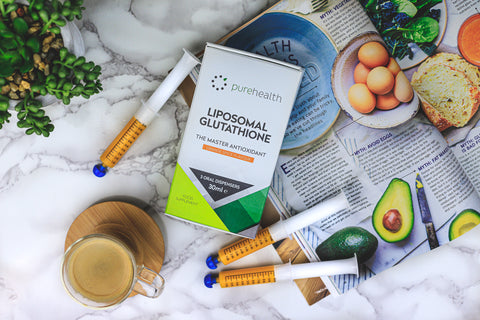Biohack Your Summer Allergies
For most people, summer equals heavenly warm weather, long days, and BBQs with friends and family. Unfortunately, there are many people for whom spring and summer mean only one thing: seasonal allergies! Sneezing, congestion, watery and itchy eyes, sinusitis, and puffiness can really ruin your plans.
Does this sound like you?
Keep reading as we explore how you can reduce allergies naturally.
What Causes Summer Allergies?
Summer allergies occur when the immune system overreacts to the increase in pollen particles in the air. As the body tries to rid itself of allergens, it releases antibodies intended to stimulate pro-inflammatory chemicals like histamine. The result is the dreaded symptoms of hay fever or allergic rhinitis.
7 Biohacks to Reduce Allergies
Many people depend on over-the-counter antihistamine medication and nasal sprays to treat summer allergies. But these come with side effects and can create dependence. Plus, they don't get to the root of the problem, which is an overactive immune system!
Instead, try these natural biohacks.
1. Consume More Antioxidants

One of the keys to defeating allergies is to quell the inflammatory response. You can do this by harnessing the power of an anti-inflammatory diet and eating more fresh fruit and vegetables. They're rich in antioxidant polyphenols, vitamin C, and quercetin, which studies show may stabilise mast cells in the immune system and reduce histamine production (1).
Load your diet with the following foods to boost your intake of inflammation-fighting antioxidants:
- Strawberries, blueberries, raspberries, and blackberries
- Apples
- Citrus
- Grapes
- Onions
- Sweet peppers
- Green leafy vegetables
- Broccoli
- Green tea
At Pure Health, we offer high-quality antioxidant supplements to help! We have bioavailable and potent Liposomal Vitamin C as well as Liposomal Glutathione supplements of the purest quality to defend your body against allergies! Known as the body's master antioxidant, glutathione is a powerful free-radical scavenger that’s also responsible for recycling other antioxidant compounds in the body.
2. Avoid High Histamine Foods

If you struggle with summer allergies, you want to regulate histamine production and not add more fuel to the fire! So, steer clear of high histamine foods and beverages such as wine, cider, cheese, and fermented vegetables. Due to the fermentation process, bacteria release histamine that may exacerbate allergy symptoms when consumed (2). Check out histamineintolerance.net for more information.
3. Try Local Honey

Eating local honey may be a great antidote to seasonal allergies! Theoretically, raw honey should contain a small amount of pollen picked up by local wild bees. Consuming it (in small amounts) may desensitise your body and help the immune system build up a tolerance to pollen over time. Although studies are mixed, there's some promising research to support local honey for symptoms of allergic rhinitis (3).
Plus, honey has anti-inflammatory properties. Just make sure you start very slowly and build up over time – add a little to tea, oatmeal, or smoothies.
4. Use a Neti Pot

Steroids and prescription nasal sprays may provide relief, but they dry out the nose and may cause problems down the road. We swear by using a neti pot to flush allergens and mucus from the nasal passages!
Used for hundreds of years in traditional medicine, the neti pot is shaped to allow a warm saline solution to flow through one nostril and out the other. Research has found using saline nasal irrigation improves quality of life and reduces nasal symptoms and the need for allergy medicine (4). It's perfect for when you're in the midst of an allergy attack.
5. Get More Sunshine

If you've been advised to spend your summer avoiding the outdoors, this may be making symptoms worse! Exposure to direct sunlight is vital for your body to produce vitamin D, an immune-modulating nutrient that may help with hay fever. Interestingly, a 2019 study on people with allergic rhinitis found that correcting a vitamin D deficiency improved symptoms (5).
Getting outside in unfiltered sunlight for 15-30 minutes daily is a great place to start! Start by spending time outdoors in the afternoon, when pollen counts are lower. You can extend this to other parts of the day as you improve.
If you can't get into direct sunlight frequently, you can boost your levels of this allergy-fighting nutrient with our micelle liposomal Vitamin D3 + K2 supplement.
6. Use an Essential Oil Diffuser in Your Room

Essential oils are powerful, aromatic compounds that may be a secret weapon for those with hay fever. Science has found that inhaling essential oils – including sandalwood, geranium, and Ravensara oils – alleviates nasal symptoms and improves quality of life (6). Other oils with anti-inflammatory, expectorant, and decongestant properties include lavender, eucalyptus, and peppermint.
We suggest diffusing the oils in your home or office to reap the benefits. As a bonus, the moisture from an oil diffuser may pull pollen and other allergens from the air.
7. Keep Excess Pollen at Bay
Pollen and other allergens have a habit of sticking to clothing, bedding, and surfaces. To avoid these triggers, follow these tips:
- Take your shoes off before entering your home
- Dust and vacuum your house and office regularly
- Wash your clothes and bedding frequently
- Use a tumble dryer instead of hanging your clothes outside
- Clean the filters in your air conditioner regularly
Wishing you a happy, allergy-free summer!
Resources
- https://pubmed.ncbi.nlm.nih.gov/18958421/
- https://pubmed.ncbi.nlm.nih.gov/17490952/
- https://pubmed.ncbi.nlm.nih.gov/21196761/
- https://www.ncbi.nlm.nih.gov/pubmed/23168142
- https://pubmed.ncbi.nlm.nih.gov/31332549/
- https://www.ncbi.nlm.nih.gov/pmc/articles/PMC4808543/
